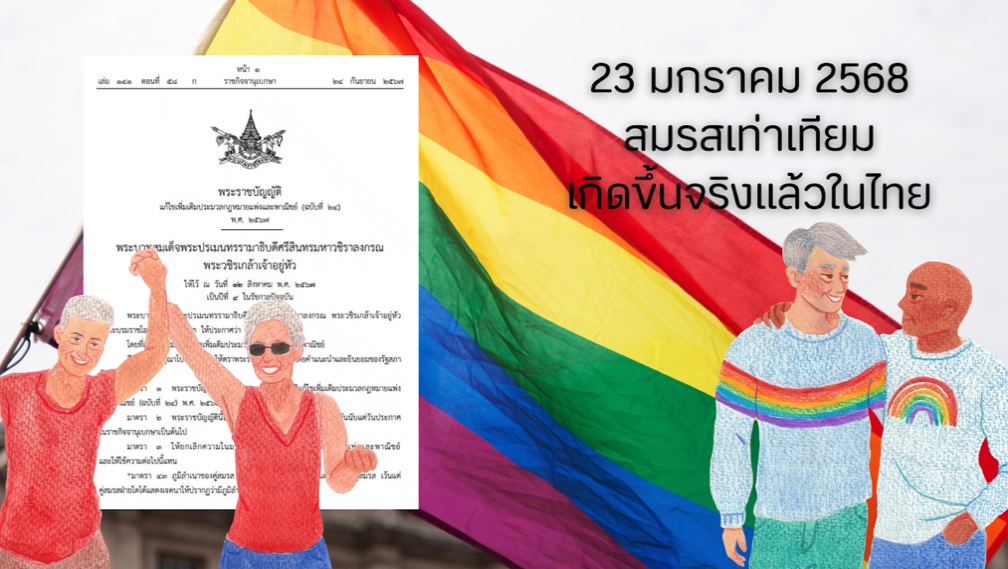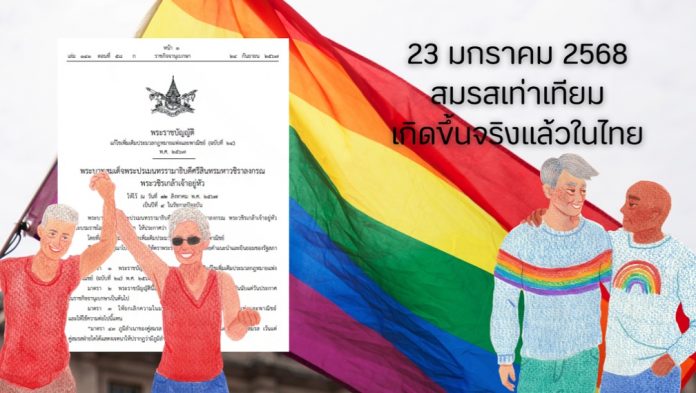กรุงเทพฯ – วันที่ 23 มกราคม 2568 จะถูกจารึกไว้ในประวัติศาสตร์ของประเทศไทยในฐานะวันที่ “สมรสเท่าเทียม” กลายเป็นความจริง หลังจากพระราชบัญญัติสมรสเท่าเทียมมีผลบังคับใช้อย่างเป็นทางการ ถือเป็นก้าวสำคัญในการสร้างความเท่าเทียมในสังคมไทย โดยเฉพาะสำหรับชุมชนผู้มีความหลากหลายทางเพศ (LGBTQ+) ที่ต้องต่อสู้และเรียกร้องสิทธินี้มายาวนาน
เส้นทางการต่อสู้ของ LGBTQIA+ สู่สมรสเท่าเทียม
ย้อนกลับไปเมื่อกว่าสองทศวรรษที่ผ่านมา การพูดถึงสิทธิของชาว LGBTQIA+ ในประเทศไทยยังคงเป็นประเด็นที่ได้รับการมองข้ามจากสังคมหลัก แม้ว่าในเชิงวัฒนธรรมประเทศไทยจะขึ้นชื่อว่าเปิดรับความหลากหลายทางเพศ แต่ในเชิงกฎหมาย กลับไม่ครอบคลุมถึงสิทธิพื้นฐานหลายประการ โดยเฉพาะเรื่องการสมรส
ความพยายามเรียกร้องสิทธิสมรสเท่าเทียมเริ่มต้นจากกลุ่มนักเคลื่อนไหวและองค์กรสิทธิมนุษยชนที่รวมตัวกันจัดกิจกรรมรณรงค์ ตั้งแต่การเดินขบวน การจัดงาน Pride ไปจนถึงการยื่นคำร้องต่อรัฐบาล หนึ่งในเหตุการณ์สำคัญเกิดขึ้นเมื่อปี 2562 เมื่อมีการผลักดันร่างกฎหมายสมรสเท่าเทียมเข้าสู่สภาเป็นครั้งแรก แต่ร่างดังกล่าวกลับถูกระงับเนื่องจากขาดเสียงสนับสนุนในสภา
อย่างไรก็ตาม การต่อสู้นี้ไม่ได้สิ้นสุดลงง่ายๆ ในช่วงหลายปีที่ผ่านมา เสียงเรียกร้องจากประชาชนโดยเฉพาะคนรุ่นใหม่ที่ผลักดันผ่านโซเชียลมีเดีย กลายเป็นพลังสำคัญในการกระตุ้นให้สังคมและรัฐบาลหันมาสนใจประเด็นนี้มากขึ้น
“พวกเราต่อสู้มายาวนานเพื่อให้สังคมไทยเข้าใจว่าความรักไม่มีข้อจำกัด ไม่ว่าจะเป็นเพศไหน ทุกคนควรได้รับสิทธิในการแต่งงานและสร้างครอบครัวเหมือนกัน” คุณอารยา นักเคลื่อนไหวด้านสิทธิ LGBTQIA+ กล่าว
กฎหมายสมรสเท่าเทียม: สิทธิที่ครอบคลุมทุกคู่รัก
พระราชบัญญัติสมรสเท่าเทียมที่มีผลบังคับใช้นี้ครอบคลุมสิทธิหลากหลายที่เท่าเทียมกับคู่สมรสชายหญิง เช่น
-
การจดทะเบียนสมรส: คู่รักเพศเดียวกันสามารถจดทะเบียนสมรสได้อย่างถูกต้องตามกฎหมาย
-
สิทธิในทรัพย์สินร่วม: การแบ่งปันทรัพย์สินและการวางแผนทางการเงินในชีวิตคู่
-
สิทธิด้านการแพทย์: การตัดสินใจแทนคู่สมรสในกรณีฉุกเฉินทางการแพทย์
-
สิทธิในการดูแลบุตร: คู่รักสามารถรับบุตรบุญธรรมและมีสิทธิดูแลบุตรเหมือนคู่สมรสเพศชายหญิง
นอกจากนี้ ยังมีการแก้ไขข้อกฎหมายเพื่อเปิดโอกาสให้คู่รักเพศเดียวกันสามารถใช้นามสกุลร่วมกันได้ รวมถึงสิทธิประโยชน์ด้านประกันสังคมและการวางแผนมรดกที่เท่าเทียม
ปฏิกิริยาจากสังคมและการเฉลิมฉลอง
หลังการบังคับใช้กฎหมายสมรสเท่าเทียม บรรยากาศทั่วประเทศเต็มไปด้วยความยินดีและการเฉลิมฉลอง โดยเฉพาะในกลุ่มชาว LGBTQIA+ หลายองค์กรได้จัดกิจกรรมเพื่อขอบคุณนักเคลื่อนไหว ผู้สนับสนุน และผู้ที่มีส่วนร่วมในการผลักดันกฎหมายฉบับนี้
นายกรัฐมนตรีกล่าวในพิธีเฉลิมฉลองว่า “วันนี้เป็นวันแห่งประวัติศาสตร์ที่สะท้อนถึงความก้าวหน้าของสังคมไทย การบังคับใช้กฎหมายสมรสเท่าเทียมแสดงให้เห็นถึงความมุ่งมั่นของรัฐบาลในการสร้างสังคมที่ทุกคนมีสิทธิและความเท่าเทียมกัน”
ในขณะเดียวกัน องค์กรสิทธิมนุษยชนหลายแห่งมองว่ากฎหมายฉบับนี้ไม่เพียงแค่เป็นชัยชนะของชาว LGBTQIA+ ในประเทศไทย แต่ยังเป็นแรงบันดาลใจให้กับประเทศอื่นๆ ในภูมิภาคเอเชียตะวันออกเฉียงใต้
ความสำคัญของสมรสเท่าเทียมต่ออนาคตสังคมไทย
กฎหมายสมรสเท่าเทียมไม่ได้เป็นเพียงสัญลักษณ์ของความเท่าเทียม แต่ยังเป็นก้าวสำคัญในการยกระดับคุณภาพชีวิตของทุกคนในสังคม การบังคับใช้กฎหมายนี้ช่วยสร้างความมั่นคงทางกฎหมายและสังคมให้กับคู่รัก LGBTQIA+ และยังเป็นจุดเริ่มต้นในการสร้างความเข้าใจและความยอมรับในความหลากหลายทางเพศในทุกระดับของสังคม
ประเทศไทยในวันนี้ได้พิสูจน์ให้เห็นแล้วว่า สังคมที่เปิดรับความหลากหลาย คือสังคมที่พร้อมก้าวไปสู่อนาคตที่สดใสและยุติธรรมสำหรับทุกคน
Marriage Equality Becomes a Reality in Thailand – A Long Journey Toward Equality in Society

Bangkok – January 23, 2025, will forever be marked in Thailand’s history as the day “marriage equality” became a reality. With the official enactment of the Marriage Equality Act, this milestone represents a significant step toward fostering equality in Thai society, particularly for the LGBTQIA+ community, who have long fought for and demanded this fundamental right.
The LGBTQIA+ Community’s Long Journey Toward Marriage Equality
Over the past two decades, the rights of LGBTQIA+ individuals in Thailand were often overlooked by mainstream society. While culturally, Thailand has been recognized for its acceptance of gender diversity, legal recognition of fundamental rights, especially the right to marry, remained out of reach.
The push for marriage equality began with activists and human rights organizations organizing campaigns, from pride parades and marches to formal petitions submitted to the government. A pivotal moment occurred in 2019 when a draft bill for marriage equality was introduced in Parliament for the first time. However, the bill was stalled due to insufficient support within the legislative body.
Despite these setbacks, the fight did not end. Over the years, public advocacy—driven by younger generations and amplified through social media—became a powerful force that compelled both society and the government to pay closer attention to the issue.
“We’ve fought for so long to make Thai society understand that love has no boundaries. Regardless of gender, everyone deserves the right to marry and build a family,” said Araya, a prominent LGBTQIA+ rights activist.
Marriage Equality Act: Rights for All Couples
The newly enacted Marriage Equality Act grants LGBTQIA+ couples equal rights as heterosexual couples in various aspects, such as:
-
Marriage registration: Same-sex couples can legally register their marriage.
-
Joint property rights: Couples can share assets and manage their finances together.
-
Medical rights: The law allows spouses to make decisions on each other’s behalf in medical emergencies.
-
Parental rights: LGBTQIA+ couples can adopt children and have equal parental rights as heterosexual couples.
Additionally, amendments to existing laws enable same-sex couples to share surnames, access social security benefits, and plan inheritances equitably.
Public Reactions and Celebrations
Following the enactment of the Marriage Equality Act, celebrations erupted nationwide, particularly within the LGBTQIA+ community. Numerous organizations held events to thank activists, supporters, and everyone who contributed to making the law a reality.
During the official celebration ceremony, the Prime Minister remarked, “Today is a historic day that reflects the progress of Thai society. The enforcement of the Marriage Equality Act demonstrates the government’s commitment to building a society where everyone is entitled to equal rights and fairness.”
Meanwhile, human rights organizations praised the law as not only a victory for LGBTQIA+ people in Thailand but also an inspiration for other countries in Southeast Asia.
The Significance of Marriage Equality for Thailand’s Future
The Marriage Equality Act is not just a symbol of fairness but a crucial step toward improving the quality of life for everyone in society. Its enactment provides legal and social security for LGBTQIA+ couples and paves the way for greater understanding and acceptance of gender diversity across all levels of society.
Thailand has now proven that a society embracing diversity is one ready to advance toward a brighter and more just future for all.

















